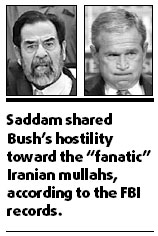
|
WORLD> America
 |
|
Saddam had something in common with Bush: Hostility for Iran mullahs
(China Daily)
Updated: 2009-07-03 09:29 WASHINGTON: Saddam Hussein believed Iran was a significant threat to Iraq and left open the possibility that he had weapons of mass destruction rather than appear vulnerable, according to declassified FBI documents on interrogations of the former Iraqi leader. 
He believed Iraq was being threatened by others in the region and must appear able to defend itself, the report said. The FBI reports, released on Wednesday, said Saddam asserted that he was more concerned about Iran discovering Iraq's weaknesses and vulnerabilities than the repercussions of the United States for blocking the return of UN weapons inspectors who were searching for WMD. "In his opinion, the UN inspectors would have directly identified to the Iranians where to inflict maximum damage to Iraq," according to the documents obtained and released by the National Security Archive, a non-governmental research institute. Saddam began a bloody border war with Iran in 1980 that lasted until 1988, during which Iraq used chemical weapons. Former US President George W. Bush launched the Iraq war in 2003, citing a threat of weapons of mass destruction from Saddam's government, but no such weapons were ever found. FBI special agents carried out 20 formal interviews and at least five "casual conversations" with the former Iraqi leader after his capture by US troops in December 2003, according to the documents. Saddam, identified as "High Value Detainee #1," shared Bush's hostility toward the "fanatic" Iranian mullahs, according to the FBI records of conversations from February through June 2004 between Saddam and Arabic-speaking agents in his detention cell at Baghdad International Airport. Saddam also denied any connections to Al-Qaida leader Osama bin Laden, who he called a "zealot", and cited the Democratic Republic of Korea (DPRK) as his most likely ally in a crunch, according to the documents. He also takes personal responsibility for ordering the launching of SCUD missiles against Israeli targets during the 1991 Persian Gulf War, because he blamed Israel and its influence in the United States for "all the problems of the Arabs," the reports said. During the interviews, Saddam rejects some examples of what he viewed as myths, like his purported use of body doubles. According to the notes, Saddam said he could recall using the telephone only twice since March 1990 and that he communicated primarily through couriers. Saddam was executed in December 2006 after being convicted of crimes against humanity by an Iraqi court for the killing of 148 Shi'ite men and boys following a 1982 assassination attempt. Reuters
|